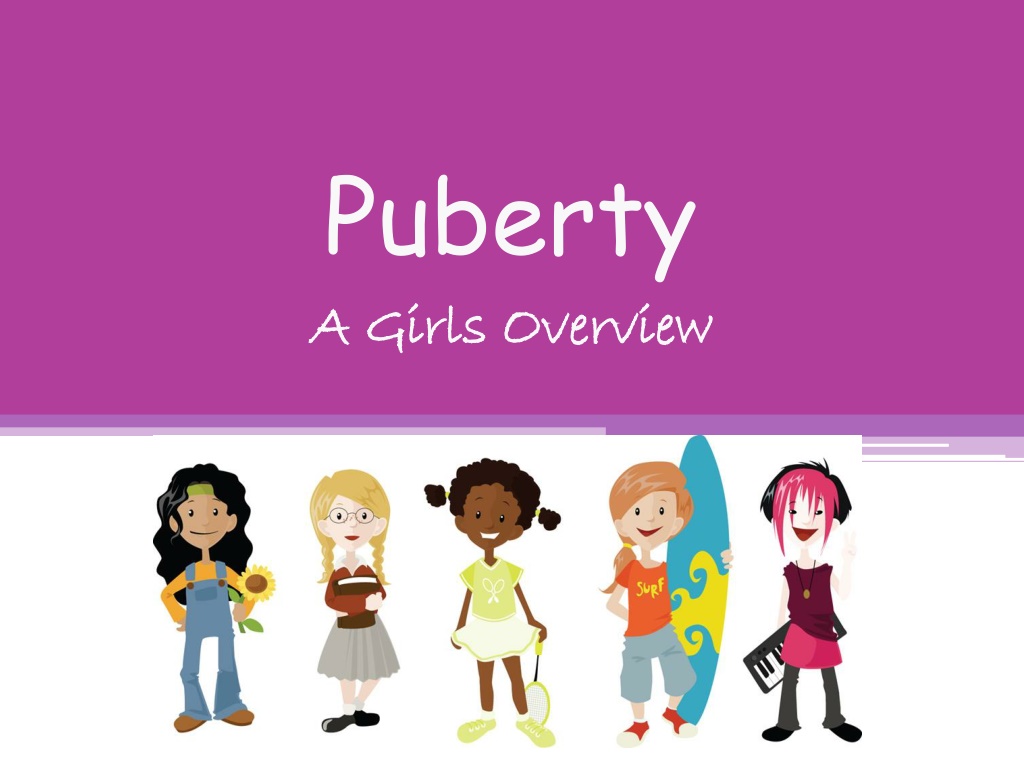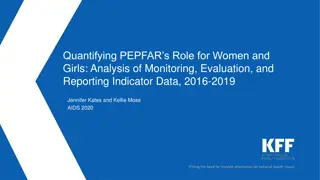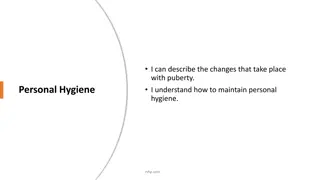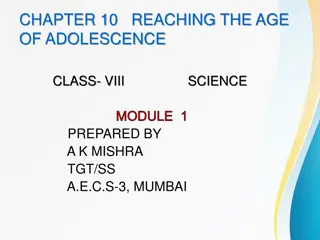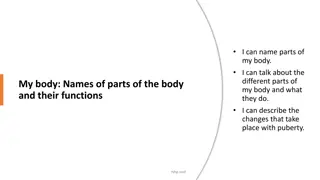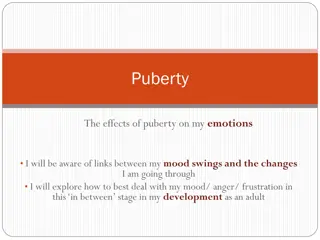Understanding Puberty: A Guide for Girls
Puberty is a significant stage in a girl's life when her body undergoes various physical and emotional changes, preparing her for young adulthood. Hormones like estrogen, progesterone, and testosterone play vital roles in these transformations. Physical changes include growth spurts, body hair growth, breast development, and mood swings. Emotionally, girls may experience feelings of confusion, independence, and fluctuating relationships with friends and family. This comprehensive guide provides insights into the changes that occur during puberty, offering valuable information and support for girls navigating this transitional period.
Download Presentation

Please find below an Image/Link to download the presentation.
The content on the website is provided AS IS for your information and personal use only. It may not be sold, licensed, or shared on other websites without obtaining consent from the author. Download presentation by click this link. If you encounter any issues during the download, it is possible that the publisher has removed the file from their server.
E N D
Presentation Transcript
Puberty A Girls A Girls Overview Overview
What is puberty? Puberty is the time when your body changes from being a child to a young adult. Your body is preparing itself to be able to reproduce (have a baby).
Why does it happen? Puberty starts when extra amounts of chemicals called hormones start to be produced in the body. The body produces the hormones OESTROGEN, PROGESTOGEN and TESTOSTORONE which are responsible for many different changes in the body. The brain and pituitary gland release the hormones that regulate the reproductive organs.
Physical Changes Physical changes happen because the body starts to produce chemicals called hormones; oestrogen, progesterone and testosterone. Puberty can happen anywhere between 8 and 18 years of age.
Physical Changes cont. The female body mainly produces progesterone and oestrogen which start the changes of puberty. Usually starts between 8-13 years. The male body mainly produces testosterone which start the changes of puberty. Usually stars between 10-15 years.
What changes happen to girls? Get taller and heavier Bones grow bigger and heavier Hips get wider and more curvy Face changes shape Voice gets a little deeper Hair grows under the armpits, around the genitals (pubic hair) Hair on arms and legs grows darker Breasts and nipples get larger Body sweats more May have mood swings
Emotional Changes Your mind and feelings change too. - You may feel lonely and confused. - You may have mood swings (including irritability, tearfulness, overwhelming happiness and confusion). - You may want more independence. - You may also become argumentative and bad tempered. - You may love your friends or family at times and not want to have anything to do with them at other times. - Sometimes you may feel like a grown-up, other times like a kid.
What can cause conflict with parents? Homework Clothes Games consoles (i.e. Wii, X-Box, Playstation) Internet usage Music choices and volume Friends Bedroom Choice of leisure activities
How to keep parents happy Keep them involved, tell them how you are feeling about things. Ask their advice, listen and if you disagree tell them why. Accept that they have the right to lay down some rules, be willing to meet them halfway. Try not to lose your temper, if you show them you can accept when they say no, may be they will be willing to say yes in the future. When going out, tell them where and with who, agree a time when you will return and ALWAYS let them know if you are going to be late. Help more around the house, without waiting to be asked!
What can cause conflict with friends? Other friendships, new friends. Misunderstandings, arguments. Girlfriends or boyfriends. Choice of things to do together. The way they talk to you, making you feel bad about yourself. They do not listen to you, they only talk about themselves. Jealousy.
Give and take with friends Try to not demand too much support and attention without giving some in return, they will feel resentful and used. Show mutual respect. Be honest with them. If you let a friend tell you how to behave and what to do, then you are not being fair to yourself or to them.
The Menstrual Cycle The menstrual cycle is usually 28 days. However it can vary from between 23-35 days.
Your Period Bleeding can last between 3 and 8 days. Blood flow may be heavier in the first few days. The average blood loss is only around 80ml (roughly 3 tablespoons). Periods happen once a month but your body takes time do get into a routine so for the first year or so the time between each period may vary.
When will my period start? Usually between 10-16 years old About 2 years after your breasts develop Soon after you grow pubic hair After you start to notice vaginal discharge REMEMBER every girl is different!
Things to try Have a warm bath Massage your stomach Have a nice warm drink Use a hot water bottle or use a heat pad. Eat a well balanced diet. Exercise
Feminine Protection There are two types of protection you can use during your period to absorb your period to stop it getting on to your clothes/underwear. The choice is a personal choice and different for each girl. . Sanitary Towels . Tampons
Sanitary Towel Worn outside your body, in your underwear. Many different absorbencies. Wings provide extra protection. Change frequently to keep fresh and dry (generally every 4-6 hours, more often when your period is heavy). They will start to leak if you don t change them!
How to use a sanitary towel 1. Pull off paper strip or wrapper. 2. Attach sticky part securely to center of underwear. 3. For wings, peel off paper strips and wrap around sides of underwear.
Tampons Worn inside your body in your vagina to absorb menstrual flow. Different range of absorbencies. Good for swimming and gymnastics. Should be changed regularly (every 4-8 hours, more often when your period is heavy).
Planning Mark on a calendar the date of your first period. Count 28 days from the day of your FIRST blood show, this will give you a rough idea of when your next period will be. Always carry some spare knickers and sanitary towels in your bag. REMEMBER periods will not have a set pattern in the beginning, they will eventually settle into their own pattern.
Sweat Sweat is your body s natural way of helping you to cool down. Sweat can also some times become smelly when the chemicals it contains mixes with bacteria that live naturally on your skin.
H Personal Hygiene What do we do?
Grow taller and heavier Bones grow bigger and heavier Nose and jaw get bigger and face gets longer Get more muscles Hair and skin can become oily and they may get spots Body sweats more Hair grows on the face, under the armpits, around the genitals (pubic hair). May get more hair on arms, legs and chest. Voice gets deeper May have mood swings.
The Process https://www.bbc.com/education/clips/zfcrkqt
It is all a normal and natural way for human beings to grow up.
Staying Safe When I feel safe/unsafe Physical/Mental Abuse Bullying Sexual Abuse Who can you talk to if you don t feel safe?
Your Rights You have the right to make your own decisions and give consent. If the person says yes, they have given their consent. If the person says no, they have not given consent. If a person is not sure, or does not say yes , then this is not consent. Can you think of any situations you need to think about consent?
Being a Parent What kind of families do you know about? If you were a parent What would you have to do? What might be difficult? What might you have to think about?
